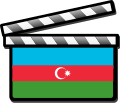| Cinema of Azerbaijan |
|---|
 |
| Lists of Azerbaijani films |
| pre-1920 |
| 1920s |
| 1930s |
| 1940s |
| 1950s |
| 1960s |
| 1970s |
| 1980s |
| 1990s |
| 2000s |
| 2010s |
| 2020s |
| Animation |
| Azerbaijanfilm |
| People |
A list of the most recent films produced in Azerbaijan ordered by year of release in the 2010s: